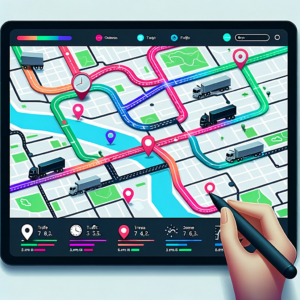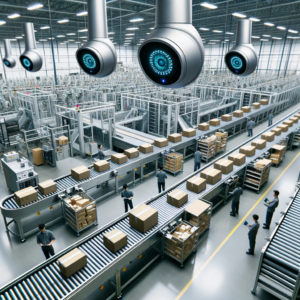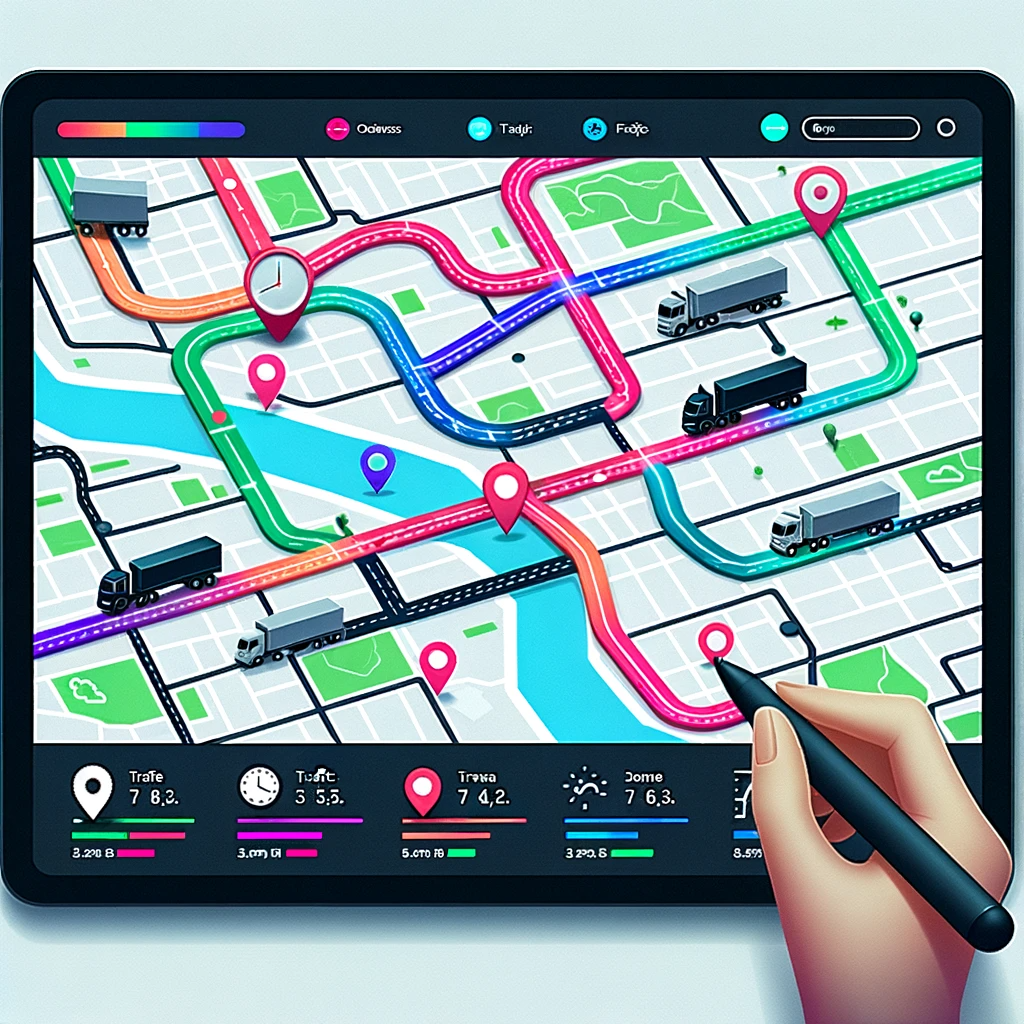In today’s fast-paced business world, the integration of AI technology into supply chain management and logistics has revolutionized the way businesses operate. AI, or Artificial Intelligence, is transforming these industries by optimizing processes, improving efficiency, and enabling seamless decision-making. Whether it’s predictive analytics that foresee potential disruptions, autonomous vehicles for enhanced transportation, or machine learning algorithms that enhance inventory management, AI is streamlining the supply chain and helping businesses stay one step ahead. With its ability to quickly analyze and interpret vast amounts of data, AI is paving the way for a more efficient and agile supply chain management system, ultimately benefiting businesses and customers alike.
Understanding AI in the Context of Supply Chain and Logistics
Artificial Intelligence (AI) is revolutionizing the way businesses operate, and its impact on supply chain management and logistics is undeniable. AI refers to the simulation of human intelligence in machines that are programmed to think and learn like humans. It encompasses various technologies such as machine learning, natural language processing, and computer vision. In the context of supply chain and logistics, AI can analyze vast amounts of data, identify patterns, and make informed decisions, leading to improved efficiencies, cost savings, and better customer experiences.
AI: A Brief Explanation
AI involves the development of computer systems that can perform tasks that typically require human intelligence. It is achieved through the use of algorithms and statistical models that enable machines to process information and make decisions. AI can be categorized into two types: narrow AI and general AI. Narrow AI, also known as weak AI, is designed to perform specific tasks, while general AI refers to machines that possess the ability to understand, learn, and perform any intellectual task that a human can do.
The Role of AI in Supply Chain Management and Logistics
AI plays a crucial role in supply chain management and logistics by automating processes, providing predictive capabilities, optimizing operations, managing risks, enhancing customer service, and promoting sustainability. With its ability to process vast amounts of data in real-time, AI can analyze trends, identify patterns, and make accurate predictions. This enables businesses to make informed decisions and optimize their supply chain operations, ultimately leading to better efficiency, reduced costs, and improved customer satisfaction.
Predictive Capabilities of Artificial Intelligence
Using AI for Demand Forecasting
AI is revolutionizing demand forecasting by enabling businesses to make accurate predictions based on historical data, market trends, and external factors. By analyzing vast amounts of data, AI algorithms can identify patterns that are beyond human capacity, resulting in more accurate demand forecasts. This enables businesses to optimize inventory levels, reduce stockouts, and meet customer demands more effectively. AI-powered demand forecasting also helps in identifying trends and seasonality patterns, allowing businesses to plan their production and logistics operations accordingly.
AI and Inventory Management
AI has a significant impact on inventory management by optimizing stock levels, improving inventory turnover, and reducing holding costs. By analyzing historical data, market trends, and real-time sales data, AI algorithms can accurately predict demand and determine the appropriate quantity and timing of orders. This reduces the risk of excess inventory or stockouts, resulting in cost savings and improved operational efficiency. AI can also help in identifying slow-moving or obsolete inventory, enabling businesses to take timely action to liquidate or dispose of such items.
Predictive Maintenance with AI
AI is transforming maintenance practices by enabling predictive maintenance. By analyzing real-time data from sensors and IoT devices, AI algorithms can identify patterns and trends that indicate potential machine failures. This allows businesses to take proactive maintenance actions, such as scheduling maintenance before a breakdown occurs or replacing components before they fail. Predictive maintenance reduces downtime, improves asset performance, and extends the lifespan of equipment, resulting in cost savings and improved operational efficiency.

AI and Supply Chain Optimization
Route Optimization through AI
AI is revolutionizing route optimization in supply chain and logistics operations. By analyzing data such as shipment details, traffic patterns, weather conditions, and order priorities, AI algorithms can determine the most efficient routes for deliveries. This reduces transportation costs, improves on-time delivery rates, and enhances overall supply chain performance. AI-powered route optimization also takes into account constraints such as vehicle capacities, driver availability, and customer preferences, ensuring that deliveries are optimized considering both cost and customer satisfaction.
Strategic Decision Making with AI
AI empowers businesses to make strategic decisions by providing valuable insights and recommendations. By analyzing data from various sources, including internal systems, market trends, and customer feedback, AI algorithms can generate actionable insights and recommendations for improving supply chain operations. This enables businesses to make data-driven decisions, optimize their supply chain strategies, and adapt to changing market conditions. AI-powered strategic decision making also helps in identifying potential risks or opportunities, enabling businesses to proactively mitigate risks or capitalize on emerging trends.
Supplier Selection and Procurement with AI
AI is transforming supplier selection and procurement processes by automating and optimizing supplier discovery, qualification, and evaluation. AI algorithms can analyze vast amounts of data, including supplier profiles, performance metrics, and industry trends, to identify potential suppliers who meet specific criteria. This streamlines the procurement process, reduces the time and effort required for supplier selection, and improves overall procurement efficiency. AI-powered supplier selection also helps in identifying potential risks or opportunities associated with suppliers, enabling businesses to make informed decisions and mitigate risks.
Operational Efficiency Using AI
Reducing Operational Costs with AI
AI plays a vital role in reducing operational costs in supply chain and logistics operations. By automating manual tasks, optimizing resource allocation, and minimizing errors, AI helps businesses achieve higher operational efficiency and cost savings. For example, AI-powered automation can reduce the need for manual data entry and paperwork, resulting in time savings and reduced labor costs. AI can also optimize resource allocation by analyzing data such as demand patterns, production capacities, and workforce availability, ensuring that resources are deployed efficiently, reducing costs and improving productivity.
Increasing Speed and Accuracy with AI
AI enables businesses to increase speed and accuracy in various supply chain and logistics processes. By automating repetitive tasks and leveraging advanced analytics, AI can significantly improve process speed and accuracy. For example, AI-powered robotic process automation (RPA) can automate manual data entry tasks, reducing errors and speeding up data processing. AI-powered analytics can also analyze vast amounts of data in real-time, providing timely insights and enabling businesses to make faster decisions. The increased speed and accuracy achieved through AI result in improved operational efficiency, reduced lead times, and enhanced customer satisfaction.
Improving Worker Safety with AI
AI technologies are being used to improve worker safety in supply chain and logistics operations. For example, AI-powered computer vision systems can monitor workplaces and identify potential safety hazards, such as slip and fall risks or unauthorized access to restricted areas. AI algorithms can also analyze real-time sensor data from wearable devices to detect signs of fatigue or physical strain among workers, prompting appropriate interventions to prevent accidents or injuries. By improving worker safety, AI contributes to a healthier and more productive workforce, reducing the risk of downtime and associated costs.

Role of AI in Logistics Management
AI in Warehouse Management
AI is transforming warehouse management by automating and optimizing various processes. AI-powered robots and autonomous guided vehicles (AGVs) can automate tasks such as picking, packing, and sorting, reducing the need for manual labor and increasing operational efficiency. AI algorithms can optimize warehouse layout and product placement, minimizing travel distances and improving order fulfillment speed. AI-powered warehouse management systems (WMS) can also analyze data from various sources, such as inventory levels, order volumes, and customer priorities, to optimize order allocation and improve overall warehouse performance.
AI in Shipping and Delivery
AI is revolutionizing shipping and delivery operations by streamlining processes, increasing efficiency, and improving customer satisfaction. AI-powered systems can automate order processing, track shipments in real-time, and provide accurate delivery estimates to customers. AI algorithms can optimize delivery routes, taking into account factors such as traffic conditions, delivery windows, and driver availability. This minimizes delivery costs, improves on-time delivery rates, and enhances overall customer experience. AI-powered delivery also enables businesses to offer services such as real-time tracking, delivery notifications, and flexible delivery options, enhancing customer satisfaction and loyalty.
AI in Return and Reverse Logistics
AI technologies are being used to improve return and reverse logistics processes. AI algorithms can analyze return patterns and identify the reasons for returns, enabling businesses to take appropriate actions to prevent future returns. AI-powered systems can automate return authorization and processing, reducing manual effort and improving process efficiency. AI can also optimize reverse logistics operations by analyzing data such as product condition, inventory levels, and customer preferences, enabling businesses to make informed decisions regarding product disposition, refurbishment, or resale. AI-powered return and reverse logistics help businesses reduce costs, minimize waste, and improve overall customer satisfaction.
AI and Risk Management in Supply Chain
AI for Predicting Supply Chain Disruptions
AI plays a crucial role in predicting and managing supply chain disruptions. By analyzing data from various sources, including historical data, market trends, and external factors, AI algorithms can identify potential risks or disruptions and provide early warnings. This enables businesses to proactively manage risks, develop contingency plans, and ensure business continuity. For example, AI algorithms can analyze weather data to predict potential disruptions in transportation routes, enabling businesses to reroute shipments to avoid delays. AI-powered risk management helps businesses mitigate risks, minimize disruptions, and protect their supply chain operations.
Contingency Planning with AI
AI technologies are used to develop contingency plans in the event of supply chain disruptions. By analyzing historical data, market trends, and scenario-based simulations, AI algorithms can identify potential risks and develop contingency plans to mitigate those risks. AI-powered contingency planning takes into account various factors, such as demand patterns, supplier capabilities, and logistics constraints, to ensure that businesses are prepared for unexpected events. For example, AI algorithms can optimize inventory levels and safety stock quantities to ensure that businesses can respond to sudden changes in demand or supplier disruptions. AI-powered contingency planning improves supply chain resilience and enables businesses to respond effectively to unforeseen events.
AI for Fraud Detection in Supply Chain
AI technologies are used to detect and prevent fraudulent activities in supply chain operations. By analyzing data from various sources, including financial transactions, supplier performance metrics, and market trends, AI algorithms can identify patterns or anomalies that indicate potential fraud. AI-powered fraud detection systems can automatically flag suspicious activities, enabling businesses to investigate and take appropriate actions. For example, AI algorithms can identify inconsistencies in invoice records or detect patterns of abnormal supplier behavior, alerting businesses to potential fraudulent activities. AI-powered fraud detection helps businesses protect their supply chain operations, reduce financial losses, and ensure compliance with regulations.

Customer Service Enhancement Through AI
Role of AI in Improving Customer Service
AI is transforming customer service in supply chain and logistics operations. By analyzing data from various sources, such as customer feedback, order histories, and social media interactions, AI algorithms can provide personalized and responsive customer service. AI-powered chatbots can interact with customers in real-time, answering queries, providing product information, and assisting with order tracking. AI also enables businesses to offer self-service options, such as online order tracking or automated returns authorization, enhancing customer convenience and satisfaction. AI-powered customer service improves overall customer experience, increases customer loyalty, and drives repeat business.
Personalized Customer Experience Through AI
AI enables businesses to provide personalized customer experiences in supply chain and logistics operations. By analyzing customer data, such as purchase history, preferences, and browsing behavior, AI algorithms can generate personalized recommendations and offers. This enables businesses to tailor their marketing messages and promotions to individual customers, increasing engagement and conversion rates. AI-powered personalization also extends to post-purchase experiences, such as personalized order updates, customized packaging, or targeted cross-selling and upselling recommendations. By delivering personalized experiences, AI helps businesses build stronger customer relationships, foster loyalty, and differentiate themselves in the market.
AI and Customer Issue Resolution
AI technologies are used to improve customer issue resolution in supply chain and logistics operations. By analyzing customer feedback, product performance data, and historical issue resolutions, AI algorithms can identify patterns and trends that help in resolving customer issues more effectively. AI-powered systems can automatically categorize and prioritize customer issues, enabling businesses to allocate resources and respond in a timely manner. AI can also provide recommendations for issue resolution based on similar cases or best practices. AI-powered customer issue resolution improves customer satisfaction, reduces resolution times, and enhances overall customer loyalty.
AI and Sustainability in the Supply Chain
Reducing Environmental Footprint with AI
AI technologies contribute to reducing the environmental footprint of supply chain and logistics operations. By optimizing routes, vehicle assignments, and resource allocation, AI algorithms can minimize fuel consumption, carbon emissions, and overall environmental impact. For example, AI-powered route optimization can reduce unnecessary mileage, leading to fuel savings and reduced emissions. AI can also optimize warehouse operations to minimize energy consumption or implement predictive maintenance to reduce equipment downtime and energy waste. AI-powered sustainability initiatives not only benefit the environment but also align with growing consumer demands for eco-friendly supply chain practices.
Smart Waste Management with AI
AI is transforming waste management practices in supply chain operations. By analyzing data on waste generation, recycling rates, and landfill capacities, AI algorithms can optimize waste management processes to minimize waste generation and maximize recycling. AI-powered systems can recommend waste reduction initiatives, such as packaging redesign or process optimization, based on data analysis and simulations. AI can also monitor waste disposal practices and identify opportunities for recycling or repurposing waste materials. AI-powered waste management helps businesses reduce waste, promote circular economy practices, and improve overall sustainability of the supply chain.
AI in Resource Optimization
AI plays a crucial role in resource optimization in supply chain and logistics operations. By analyzing data on resource utilization, demand patterns, and performance metrics, AI algorithms can optimize the allocation of resources such as labor, equipment, and inventory. AI-powered systems can generate resource utilization forecasts, recommend staffing levels or inventory levels based on demand forecasts, and optimize production or distribution schedules. AI also enables businesses to identify opportunities for resource sharing or collaboration with other organizations, reducing waste and maximizing resource efficiency. AI-powered resource optimization improves operational efficiency, reduces costs, and promotes sustainable use of resources.

Limitations and Challenges of AI in Supply Chain
Data Privacy Concerns
One of the major challenges of AI implementation in supply chain and logistics is data privacy concerns. AI algorithms require access to vast amounts of data, including customer information, supplier data, and operational data. Ensuring that this data is handled securely and in compliance with privacy regulations is crucial. Businesses must prioritize data protection measures, such as encryption, access controls, and data anonymization, to ensure the privacy and security of sensitive information. Additionally, businesses must establish clear data governance policies and communicate transparently with stakeholders about how data is collected, used, and protected.
High Implementation Costs
Implementing AI technologies in supply chain and logistics operations can involve significant upfront costs. Businesses must invest in AI infrastructure, such as computing resources, storage, and networking capabilities, to support data processing and analytics. Additionally, businesses may need to hire AI experts or train existing staff to develop and deploy AI algorithms effectively. These costs can be a barrier for smaller businesses or organizations with limited budgets. However, it is essential to consider the long-term benefits and potential cost savings that AI can bring in terms of improved operational efficiency, reduced costs, and increased customer satisfaction.
Lack of Skilled Personnel
Another challenge of AI implementation in supply chain and logistics is the lack of skilled personnel. AI technologies require expertise in data analytics, machine learning, and computer programming. Businesses may face difficulties in finding personnel with the necessary skills and experience to develop and deploy AI algorithms effectively. Additionally, the rapid advancement of AI technologies requires continuous learning and upskilling of existing personnel. To address this challenge, businesses can invest in training programs, partnerships with academia, or collaborations with AI service providers. Developing a talent pipeline of AI professionals is crucial for successful AI implementation in the supply chain and logistics industry.
Future Innovation with AI in Supply Chain and Logistics
Emerging AI Technologies in Supply Chain
The future of AI in supply chain and logistics holds immense potential for innovation. Emerging AI technologies, such as autonomous vehicles, drones, and blockchain, are set to transform the industry further. Autonomous vehicles powered by AI can revolutionize transportation by enabling self-driving trucks or drones for last-mile deliveries. These technologies have the potential to increase efficiency, reduce costs, and minimize environmental impact. Blockchain technology, coupled with AI, can enhance supply chain visibility, traceability, and transparency by securely recording and validating transactions. Such innovations are expected to further optimize supply chain operations and provide new opportunities for businesses in the future.
The Future of AI in Logistics
The future of AI in logistics is bright, with advancements in automation, robotics, and data analytics. AI-powered robots and drones are expected to play a more significant role in warehouse operations, enabling faster and more efficient picking, packing, and sorting. Delivery systems using autonomous vehicles or drones are likely to become more common, enabling faster and more flexible delivery options. AI algorithms will continue to evolve, providing better predictive capabilities, improved decision-making support, and enhanced customer service. The integration of AI with emerging technologies, such as IoT and 5G, will further enhance connectivity, data sharing, and collaboration across the supply chain.
Implications for the Industry
The widespread adoption of AI in supply chain and logistics has significant implications for the industry. Businesses that embrace AI technologies can gain a competitive advantage by improving operational efficiency, reducing costs, and enhancing customer experiences. AI-powered systems can provide valuable insights and recommendations, enabling businesses to make data-driven decisions and adapt to changing market conditions. However, the implementation of AI requires careful planning, investment, and collaboration. Businesses must develop a comprehensive AI strategy, prioritize data privacy and security, and invest in developing skilled personnel. The successful integration of AI into the supply chain and logistics industry will ultimately drive innovation, resilience, and sustainability in the global economy.











